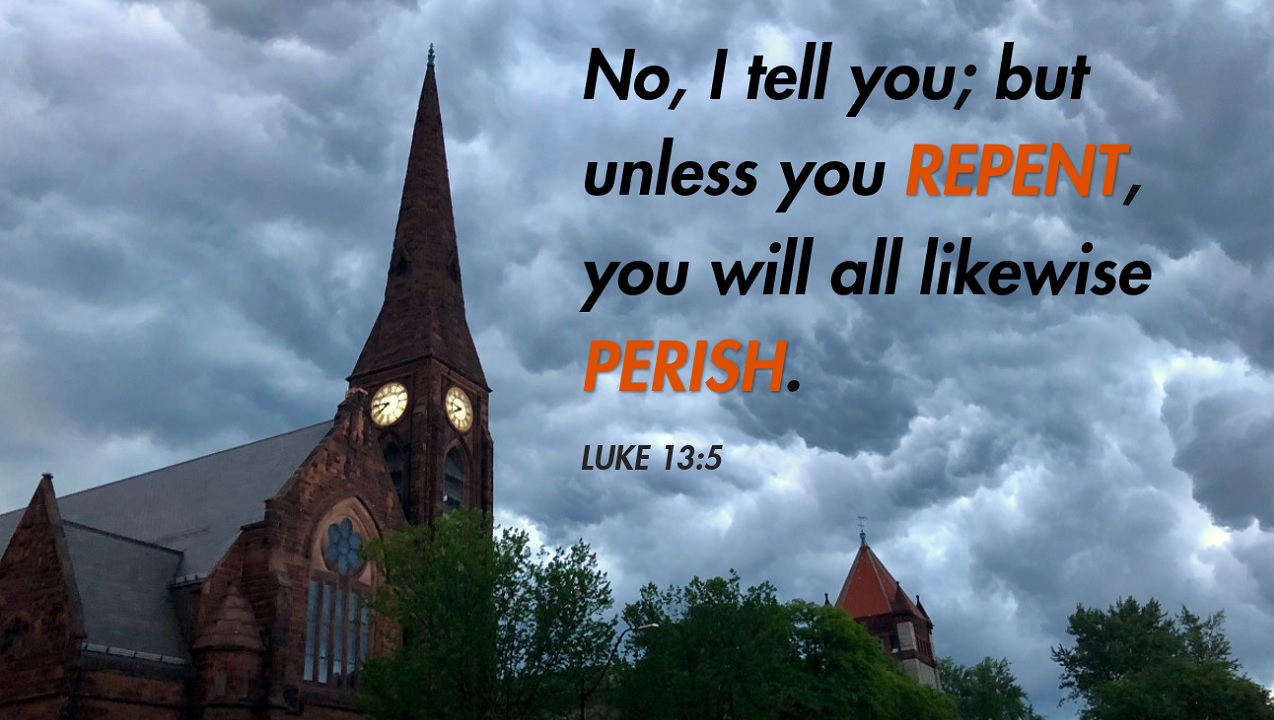Repent or Perish

EDITOR'S NOTE: This article is by Reverend Seth Yi, the pastor of the Newberry Associate Reformed Presbyterian Church, Newberry, South Carolina. Some may be offended by Seth's words; however, pray consider, he may be right. If he is . . .
______________________________________________________
Jesus highlights how tragedy exposes the fragility and unpredictability of life and thus the eternal significance of being right with God. Therefore, no matter how protected or sheltered one's life may appear to be (clearly not as much as we assumed before COVID-19), death shows no favoritism. Whether we are prepared for it or not, there is an appointed time for everyone to die and face judgment.
Two current events, one enduring reply!
In Luke 13, Jesus responds to two recent tragedies with a sobering and eternal warning that we all need to heed carefully lest we stumble upon the Rock of offense (1 Pet 2:8). In the first instance, Pilate, no friend of the Jews, mingled the blood of some Galileans with their sacrifices (v. 1). Even though Luke does not explicitly identify who these Galileans were, based on Pilate's disdain for Judaism and the involvement of "sacrifices," it is reasonable to think that they were Jews worshipping at the temple. Moreover, it is likely that it happened around Passover since that was the only festival when the laity could slaughter their own animals. To the disappointment of the crowd, likely composed of Jews, Jesus' reaction to the tragic event is unsympathetic at best and at worst callous. Surprisingly, He does not applaud them as martyrs or unsuspecting heroes. Furthermore, Jesus does not address the political, social, or national issue, but turns the sensation of the event to a call for repentance. To Jesus, what is supremely significant about this sudden loss of lives, regardless of the cause, is that it serves as a wakeup call to the living of the coming judgment and eternal death to all unrepentant sinners.
Then in v. 4, Jesus recounts another recent event where 18 were suddenly killed in an accident. Based on the Jewish historian Josephus (Jewish War 5.145), the 18 victims were likely Jews in Jerusalem. In like manner, Jesus expresses little compassion about this tragedy but reiterates the warning pronounced earlier, "repent or perish!" His response (v. 5) is identical to the first except the word "likewise" (Greek hōsautōs rather than homoios) which is slightly stronger in force and suggests by the repetition a more emphatic call to respond (BAGD 899). Jesus deliberately uses the passions that surround these tragic deaths to warn them about the need for repentance. In so doing, Jesus highlights how tragedy exposes the fragility and unpredictability of life and thus the eternal significance of being right with God. Therefore, no matter how protected or sheltered one's life may appear to be (clearly not as much as we assumed before COVID-19), death shows no favoritism. Whether we are prepared for it or not, there is an appointed time for everyone to die and face judgment (Heb 9:27).
In both of these instances, what Jesus focuses on is not the occasion, circumstances, or timing of a person's death, but the inevitability of eternal death for all those who do not repent. In other words, there is a far greater calamity that awaits those who do not repent and trust in Christ than any untimely, sudden death that one could suffer in this life. The Greek word for "perish" (vv. 3 and 5), apollymai, generally means to destroy, to ruin, to die, but here Jesus uses it with the force of eternal destruction (as in the case of Matt 10:28, "And do not fear those who kill the body but cannot kill the soul. Rather fear Him who can destroy both soul and body in hell." Compare also 1 Cor 1:18, "For the word of the cross is folly to those who are perishing, but to us who are being saved it is the power of God." "Perishing" is antithetically parallel to "being saved" which clearly has an eternal significance.). The death that Jesus warns about is the wages of sin which the soul must pay for eternity. Jesus believes that repentance is so essential in this life that He accentuates these two tragic events to warn His hearers about it. For those who did not have an eternal perspective on life, Jesus' word would have appeared cold and uncaring.
An important note to make at this point is that repentance is not merely a one-time act that happens at conversion but a way of life. Even though believers are justified by faith in Christ, they continually war against indwelling sin in this life (Rom 7:13-25). Therefore, as disciples of Christ, the call for persistent repentance is a must (Luke 9:23). In writing to a group of churches, John declares in 1 Jn 1:8, "If we say we have no sin, we deceive ourselves, and the truth is not in us." Moreover in Rev 2:1-7, Jesus confronts the church in Ephesus for abandoning their "first love"-their fundamental love for Christ and for one another. Consequently, Jesus declares to them, "Remember therefore from where you have fallen; repent, and do the works you did at first. If not, I will come to you and remove your lampstand from its place, unless you repent." In the same way, we must continue to repent of our sins lest our hearts become dull and hardened (Mt 13:15) and fall short of finishing the race (2 Tim 4:7-8). We must preach and believe the gospel every day of our lives.
Jesus continues (vv. 6-9) to herald the need for repentance in the following verses with the parable of the barren fig tree. We know from the Old Testament as well as the Gospels that the fig tree was a common metaphor for the nation of Israel. Thus, Jesus applies the need for repentance not just to individuals but specifically to God's covenant people. In particular, the parable emphasizes the need for repentance to happen sooner than later. Even for God's people there is no time to waste and presume upon God's mercy. Such an unbelieving attitude will lead to an eternally tragic end.
As with the proclamation of John the Baptist who called Israel to repent (Matt 3:2, 8, 11; Mark 1:4; Luke 3:3, 8) and to bear fruit in keeping with repentance (Luke 3:8), Jesus warns in this parable the consequence of fruitless repentance. Like the unproductive fig tree which had sufficient time to bear fruit, the church in America for several decades has squandered God's blessings in not bearing a proportionate harvest. Instead, she has deteriorated and declined despite the superabundance of grace that has been showered on her. In God's economy there has been a lack of return on His investment. As a good steward, He will not continue to waste any more resources on a bad tree. Even as Jeremiah prophesied to the nation of Judah in 29:17 ("Thus says the Lord of hosts, behold, I am sending on them sword, famine, and pestilence, and I will make them like vile figs that are so rotten they cannot be eaten."), so too the Lord declares in this parable that a day of judgment will come upon Israel because of her presumption and pride.
Nevertheless, God's mercy is extended (vv. 8-9) to allow for repentance even though the prospect of it happening is unlikely (similar to the image used by John the Baptist of the axe lying at the root of the tree in Luke 3:9). The owner's delay mirrors God's patience and alludes to the limited time that remains for a faithful response (2 Pet 3:9). Similarly, time is quickly running out for the church in America (as we have tragically witnessed over the past 18 months) to be fruitful and to be the salt and light that we have been called to be. Like the elder brother in the parable of the Prodigal Son, the conclusion of this parable is uncertain. What will happen to the fig tree? Will it bear fruit in the coming season? Likewise, will the church in America bear fruit in keeping with repentance while there is still time and God suffers long with our unfaithfulness?
What would that fruit look like? Where should this fruit first bud on the tree? In God's mercy, if we are graced with this gift by the Holy Spirit, repentance should begin with the essential purpose of the Church, namely the corporate worship of God. No service of the Church is more important or fundamental than gathering publicly to worship our Triune God. Over the past 18 months, corporate worship has been shamefully marginalized by the people of God. For all manners of unbiblical reasons (as it has become manifestly evident), the vast majority of God's people exchanged their regular venues of worship for their private residences; corporate worship was truncated to "live stream" worship; personal fellowship was mediated via a digital screen; the sacraments were virtually invisible; and the body of Christ was disembodied. The visible gathered church was almost nowhere to be found! Most tragically, God was robbed of the worship He is due! The church's light was nearly covered by a basket of fear. The fear of being in the immediate presence of the Lord which Paul declared as being "far better" than remaining in the flesh (Phil 1:23-24).
The fruit of this essential repentance needs to start with the leadership (those who were in authority to make the decision) of each local congregation confessing their sin of not making any accommodations for those who were willing in good conscience and able to gather for corporate worship, especially over an indefinite period of time. Repentance of this nature needs to be "particular" (Westminster Confession of Faith XV. 5) not "general." These leaders should confess to their congregation for their role in preventing many of the members from fulfilling their God ordained duty on the Lord's Day (Exod 20:8-11; Duet 5:12-15). The nature of this sin is so public that all those who were offended by the suspension of corporate worship should be addressed (WCF XV. 6). Such repentance that is graced in the heart will be confessed humbly and yet thankfully that there is abundant forgiveness in Christ. As the apostle John declares in 1 John 1:9, "If we confess our sins, He is faithful and just to forgive us our sins and to cleanse us from all unrighteousness." When we turn to the Lord in repentance and faith, we can be confident that we will be graciously pardoned. This fruit may be the catalyst that the Lord uses to bring forth more fruit in the lives of those members who have still not returned to corporate worship (according to some estimates as much as two thirds of the congregation before the lockdown).
As great as the temptation may be to excuse or ignore the actions of days gone by, the Lord is not so apathetic to such personal offenses. To presume that the Lord will overlook or dismiss all those Lord's Day worship gatherings that so many congregations forsook is a denial of God's very name. For the LORD is not only "a God merciful and gracious, slow to anger, and abounding in steadfast love and faithfulness, keeping steadfast love for thousands, forgiving iniquity and transgression and sin," but also One "who will by no means clear the guilty, visiting the iniquity of the fathers on the children and the children's children, to the third and the fourth generation" (Exod 34:6-7). In order to experience the steadfast love of the Lord as His covenant people, we must genuinely and authentically seek His forgiveness in repentance. Indeed, repentance is the first and necessary step towards being made right with God and enjoying the fullness of His blessed presence and grace.
As Jesus warned the Jews of His day, He warns us with the same option, repent or perish. Therefore, the divinely appointed leaders of the church must discern spiritually what is at stake and seek the LORD while He may be found; call upon Him while He is near, let them return to the LORD, that He may have compassion on them, and to their God, for He will abundantly pardon (Is 55:6-7). Nothing less than the eternal souls of men are at stake in this decision. We must not be lulled into the deception that unrepentant sin can be contained. On the contrary, God's leaders must repent of their shortsightedness, seek His forgiveness, and confess their sin to the flock of God, so that the Lord may be merciful in delaying judgment. As the people of God fill the houses of worship with renewed vigor and in greater numbers than before, may the Lord be pleased to uphold and even extend His kingdom across this land. The joyful, authentic, God-honoring, Christ-centered, Bible-saturated worship of God's people is the only hope that our nation has of recovering from this present cultural, moral, and civil freefall we are in.
May the Lord grant us what He alone can supply as we desperately seek Him in Spirit-filled repentance!

Reverend Seth Yi

Well said.
Pray that we all should, by the Holy Spirt, take this to heart.
Thank you for speaking out Pastor Yi. And not being another silent church during these darkest times in our country that any living generation has ever seen.
[…] Read More […]
[…] Read More […]
Thank you, Pastor Yi, for your faithfulness in calling the church to repentance.
Back to church is person is the message.
Well said.
Wew will do it.